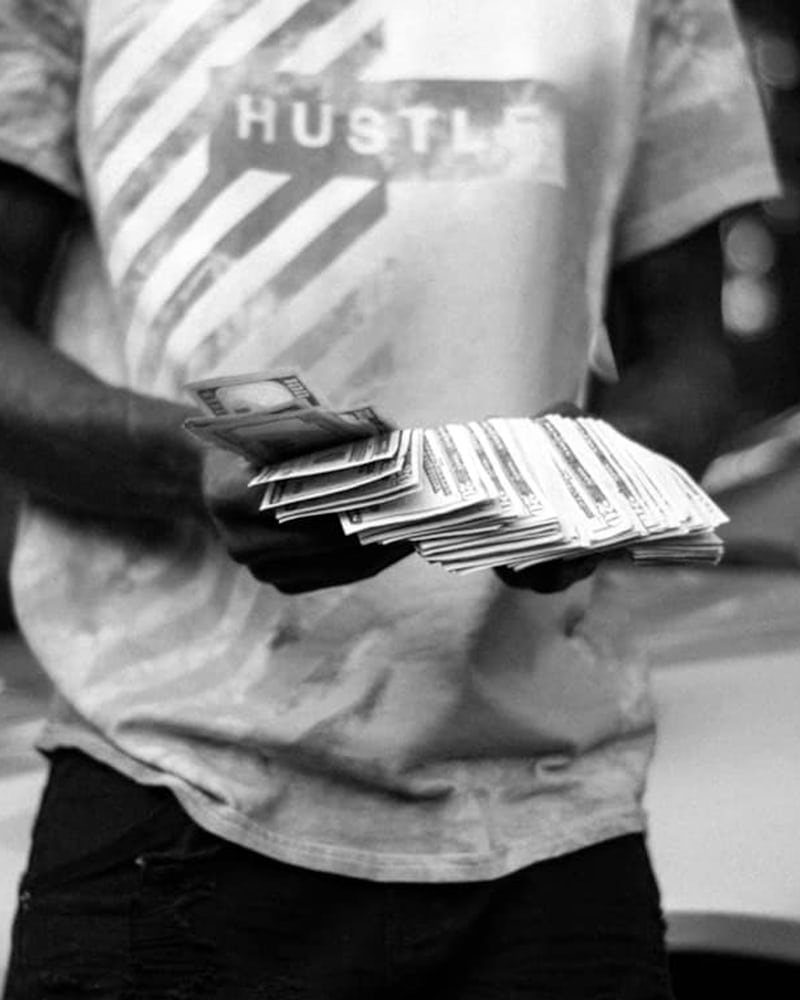The Hustle Saga: When Passion Leads to Burnout

INTRODUCTION: When Joy Turns Into a Job
There was a time when people painted just for the thrill of watching colors come alive on canvas. Tiny rooms were a gallery of chaos, unfinished sketches, splattered brushes, and soft music humming in the background. People painted for themselves; for peace, for expression. But everything changed when the hustle saga took over the day.
What was a moment of pure bliss for some quickly became a cycle of requests, custom orders, and deadlines. The joy turned into stress. Now, when many young African youth who are into painting see a blank canvas, they don't feel excitement—they feel pressure. Will this one sell? Will it get likes? Passions have become, and now a lot of these people have lost the reason they picked up a brush in the first place.
Across Africa, this isn't just a story. Young people are turning every talent, every hobby, every joy into a hustle. Not out of greed, but a necessity. With a rising unemployment rate, economic uncertainty, and the pressure to “make it,” the message is clear: if you don't earn from it, it’s not worth your time. But at what cost?
Defining The Hustle Culture Among African Youth
In much of Africa, hustle culture isn’t just a trend—it’s a coping mechanism. With rising unemployment, unstable economies, and underfunded education systems, young people are forced to think creatively just to survive. The phrase “no food for a lazy man” has become both a warning and a mantra, urging youth to monetize their skills, hobbies, and even personalities.

Photo Credit: Unsplash.
Digital entrepreneurship has fueled this momentum, from YouTube to TikTok, Instagram to Twitter (X), the algorithm rewards visibility, and visibility can mean income. A young woman who once braided hair for fun now runs a booking platform; a guy who cracked jokes in his dorm now monetizes skits with brand deals. Success stories abound, proof that with grit and good Wi-Fi, anyone can break through.
But behind the highlights, there's pressure. If you’re not making money from your “talent,” are you wasting it? The message is relentless: monetize your art, your voice, your time, everything. A viral tweet summed it up perfectly:
For many, what began as a way out of poverty is slowly becoming a prison of productivity. Hustle culture among African youth is no longer just about ambition; it’s about survival in a system that rarely gives second chances.
When Everything Becomes A Side Hustle
There was a time when hobbies offered refuge, quiet escapes from the chaos of life. But in today’s hustle-centric world, almost nothing remains untouched by the pressure to produce. The rise of side hustles has turned passion into performance and leisure into labor.
Whether it’s singing, sewing, photography, journaling, or fitness, the moment you're seen as “good” at something, the next step is often: “You should monetize that.”
This begs the question: “Should everything be monetized?”
The internet predominantly fuels this mindset; platforms like Instagram, TikTok, and Twitter constantly push narratives like “Don’t sleep on your talent”, “Turn your hobby into a 6-figure income”, or “If you’re not earning from it, you’re doing it wrong.” The pressure to be “multi-talented,” “booked and busy,” or always “on the grind” makes rest feel like rebellion.
Influencer culture has also added fuel. Watching others turn their lives into brands makes it hard not to feel behind. You don’t just read books, you start a bookstagram. You don’t just work out, you become a fitness coach. Even vulnerability is packaged for visibility.
The result? Burnout disguised as ambition. Passion diluted by deadlines. And a generation that’s constantly producing, yet quietly asking, When do we get to just enjoy something without charging for it?
The Emotional And Mental Toll
The line between passion and pressure is dangerously thin for many young Africans today. As hobbies turn into hustles and creative expression becomes content production, the emotional toll is becoming harder to ignore. What once brought joy now demands performance. What started as healing becomes a hustle.
Burnout is no longer limited to traditional 9–5 jobs. According to the World Health Organization (WHO), burnout is a syndrome resulting from chronic workplace stress, but many creatives, freelancers, and side-hustlers now find themselves exhibiting the same symptoms: exhaustion, cynicism, and reduced sense of accomplishment. The irony? They’re “working for themselves,” yet feel more overwhelmed than ever.

Photo Credit: Unsplash
This hustle-induced pressure “to do more” doesn’t just affect productivity; it seeps into mental health. Depression, imposter syndrome, and anxiety become frequent companions. You start to question your worth when your work isn’t “performing.” And when something you once loved begins to feel like a burden, it can trigger grief for the joy you’ve lost along the way.
Culture & Capitalism: Why We Feel Guilty For Resting
In many African societies, productivity is not just encouraged—it’s glorified. Hard work is deeply woven into the cultural fabric, reinforced by proverbs like “You must suffer now to enjoy later,” or “Sleep is for the poor.” These sayings, passed down through generations, reflect a survivalist mindset shaped by years of economic instability, colonial influence, and generational trauma.
As a result, rest often feels like rebellion. Taking a break is met with suspicion, especially among youth. If you’re not actively “hustling,” “grinding,” or “building something,” you risk being seen as unserious or unambitious. Social media doesn’t help—your timeline is flooded with success stories, startup pitches, and productivity hacks. Even weekends become an extension of the workweek, and illness becomes an inconvenience, not a signal to slow down.
Capitalism magnifies this guilt. It rewards output over wellness and equates human value with economic contribution. For African youth, many of whom are first-generation dream chasers or family breadwinners, the pressure is doubled. You’re not just hustling for yourself; you’re carrying generations on your back.
Rest, in this context, is misunderstood as laziness rather than the radical act of preservation it truly is. The idea of doing nothing is so unfamiliar that it triggers shame. But until we unlearn this guilt, burnout will remain a badge of honor, and joy will always come second to survival.
Rethinking Purpose Beyond Productivity
What if your worth wasn’t tied to how much you earn, produce, or post?
In a world obsessed with output and monetary benefits, rest can feel like failure and joy without profit feels indulgent. But maybe, fulfillment isn’t always found in the grind. Maybe it’s in the quiet moments where you do something simply because it lights you up inside.

Photo Credit: Unsplash
What did you once love before it had to earn you money? What would you still do if no one ever paid you for it?
These aren’t just soft questions; they’re radical ones. They invite us to imagine a version of purpose that isn’t performative, pressured, or monetized. They challenge the hustle gospel that says every talent must become a side gig, every hobby a startup.
To write without needing clicks. To paint without needing commissions. To sing, cook, dance, not for content, but for comfort.
Because sometimes, choosing to do less isn’t laziness, it’s self-preservation. And doing something for joy alone might just be the most powerful form of rebellion against burnout culture.
CONCLUSION: Finding Peace in Purpose Again
We’ve been taught to chase the bag, to turn every gift into a gig, every spark into a stream of income. But the truth is, not every passion has to become a hustle.
Sometimes, what we need most is to reclaim our joy before it burns out in the name of productivity. It's time for a cultural reset, one that gives permission to rest without guilt, to create without pressure, and to love what we do without needing it to pay the bills.
Success shouldn’t come at the expense of your soul.
“Maybe the true measure of success isn’t how much you make from your passion, but how much of yourself you don’t lose while chasing it.”
You may also like...
Super Eagles Fury! Coach Eric Chelle Slammed Over Shocking $130K Salary Demand!
)
Super Eagles head coach Eric Chelle's demands for a $130,000 monthly salary and extensive benefits have ignited a major ...
Premier League Immortal! James Milner Shatters Appearance Record, Klopp Hails Legend!

Football icon James Milner has surpassed Gareth Barry's Premier League appearance record, making his 654th outing at age...
Starfleet Shockwave: Fans Missed Key Detail in 'Deep Space Nine' Icon's 'Starfleet Academy' Return!

Starfleet Academy's latest episode features the long-awaited return of Jake Sisko, honoring his legendary father, Captai...
Rhaenyra's Destiny: 'House of the Dragon' Hints at Shocking Game of Thrones Finale Twist!

The 'House of the Dragon' Season 3 teaser hints at a dark path for Rhaenyra, suggesting she may descend into madness. He...
Amidah Lateef Unveils Shocking Truth About Nigerian University Hostel Crisis!

Many university students are forced to live off-campus due to limited hostel spaces, facing daily commutes, financial bu...
African Development Soars: Eswatini Hails Ethiopia's Ambitious Mega Projects

The Kingdom of Eswatini has lauded Ethiopia's significant strides in large-scale development projects, particularly high...
West African Tensions Mount: Ghana Drags Togo to Arbitration Over Maritime Borders

Ghana has initiated international arbitration under UNCLOS to settle its long-standing maritime boundary dispute with To...
Indian AI Arena Ignites: Sarvam Unleashes Indus AI Chat App in Fierce Market Battle

Sarvam, an Indian AI startup, has launched its Indus chat app, powered by its 105-billion-parameter large language model...
